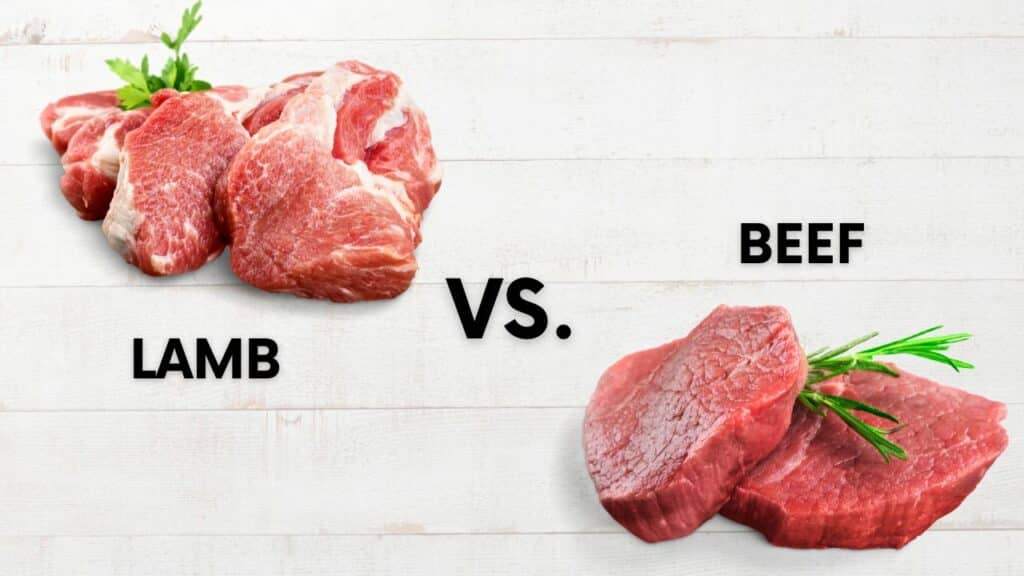Two of the healthiest types of meat that you can eat, for as long as it is lean, are lamb and beef. However, there is a wide gap in the total amount of lamb and beef consumed by people all over the world.
Taste is a usual factor, but there are other reasons that cause this disparity, such as the local availability of these meats, as well as due to religious or cultural beliefs.
Still, knowing the difference between lamb vs. beef in terms of nutrition can help sway your preferences and may even cause you to deliberately seek one over the other.
This article will look at lamb vs. beef nutrition facts, highlighting their similarities and differences. We will also aim to give you reasons why you should choose one over the other.
Table of Contents
What is Beef?
Beef is meat derived from cattle, commonly known as cows. Cattle are usually aged two to five years when they are slaughtered for meat.
If meat is acquired from calves, then this meat is called veal rather than beef. Regardless, this comparison will not make any distinction about the age, gender, or other factors that will further categorize beef from each other.
What is Lamb?
Lamb, on the other hand, is the term used for meat derived from sheep that are younger than a year old. For sheep that are over the age of three, on the other hand, their meat is called mutton.
Lastly, meat acquired from sheep that is between the ages of one and three is called hogget or yearling mutton.
However, for this discussion, the colloquialism that will be used is lamb for any meat that is derived from sheep regardless of age.
Lamb vs Beef Nutrition
There are numerous factors that can affect the nutritional values of each serving of lamb or beef. These factors include the cut of the meat, the way it was cooked, as well as the diet of the animal while it was still alive.
As such, it can be difficult to ascertain as to which one is healthier.
This table by The Nutrition Insider provides a general perspective on lamb vs. beef nutrition given fixed variables of ground lamb and beef.
The table contains the nutritional values of a 3.5oz serving of lamb and a 3.5oz serving of beef with a ratio of 85% lean meat and 15% fat.
Here is another table derived from MyFoodData and the USDA which compares an 8 oz. serving each compares ribeye steak with lamb rib chops in terms of nutritional value.
Souper Sage also has a very good nutrient calculator that compares lamb vs. beef (30:70 mix) nutrition based on weight.
We will discuss the nutrient comparison between lamb and beef in more general terms. If you desire specifics, then the references above will be very helpful.
Calories
Depending on the cut, lamb can either be almost equal to almost double the number of calories per serving when compared to beef.
Generally, though, lamb is still considered to contain more calories than beef with all things being equal. Against an 85:15 ratio of beef, however, the difference in calories is negligible.
Fat
Lamb also contains more fat when compared to beef. This pertains to all three fat types, namely saturated, monounsaturated, or polyunsaturated fats.
Ground beef or lamb are generally low in fat. Again, this will depend on the cut as well as the serving size. For example, Wagyu beef can contain up to 60% fat.
Protein
Beef has slightly higher protein than lamb. For an 8 oz. serving, beef contains 27.7 grams of protein while lamb contains 25 grams.
Cholesterol
Lamb edges out beef when it comes to cholesterol content. In general, lamb contains about 10% more cholesterol when compared to beef.
Other Nutrients
As mentioned, nutritional content will vary depending on a lot of factors. As you can see, different sources will have different figures as their reference servings will not be equal.
Nevertheless, we have provided a general perspective to give you an idea of the nutritional differences between the two meats. Take note that nutritional values may differ depending on different factors.
Sodium and water content for lamb and beef are pretty much equal. We also see almost the same figures when it comes to calcium, magnesium, Vitamin B12, Vitamin B5, phosphorus, and potassium.
Lamb has higher levels of the other B Vitamins, however, the most of which is Vitamin B1 (niacin) which lamb has almost double the amount of.
Lamb also contains more folate and Vitamin E, as well as almost 4 times the amount of Vitamin K when compared to beef. Lamb has Vitamin D as well, something that beef does not have.
As for minerals, lamb is superior to beef in terms of choline, copper, manganese, and selenium.
While it may seem that lamb is more nutrient-dense than beef, as it is, the latter does have certain vitamins and minerals in higher numbers when compared to the former.
For example, beef has higher levels of iron and zinc. Beef also contains Vitamin A, something not present in lamb.
Health Benefits of Beef
Beef is a very good source of high-quality protein as well as amino acids that will help you maintain muscle mass even as you grow older. It can also help you perform better during physical activity.
The iron in beef can help prevent anemia and improve the quality of your blood. On the other hand, zinc can provide a big boost to the immune system and can aid in wound healing and other benefits.
Health Benefits of Lamb
Lamb, like beef, is also very high in protein. In regular amounts, eating lamb can aid in losing weight as well as help muscle growth and recovery, especially after surgery or a heavy workout. Weight loss is also helped by the lamb’s CLA content, but only if it is consumed in moderate amounts.
Despite lamb containing a higher number of fats, a big percentage of that is comprised of monounsaturated fats. Monounsaturated fats are considered as “good cholesterol” and can help lower the risk of heart disease, hypertension, and stroke.
Lamb also contains several nutrients that serve as antioxidants, including omega-3 fatty acids. These components help boost your immune system, regulate hormones, and improve brain health.
This makes lamb a good alternative for those who cannot get omega-3 from fish sources or supplements.
Caution When Eating Lamb or Beef
Despite lamb and beef being considered “healthy” meat, there are still precautions that must be taken when eating these meats, especially when they are prepared wrong or if they are consumed in excess.
While both beef and lamb do not contain carbohydrates, they do have a high number of calories. It can be very easy to overeat these types of meats, and doing so may lead to weight gain which can cause different complications within the body.
Excessive eating of red meat has also been linked to higher risks of heart disease. This can also lead to strokes, high blood pressure, as well as onset of type-2 diabetes.
The risks mentioned above are increased if you are obese and have a sedentary lifestyle.
The way that lamb or beef is cooked can also negatively affect your health and negate any benefits that eating these meats may have.
When grilling lamb or beef, for example, charred meats can cause the generation of hydrocarbons that are considered to be carcinogenic and have been linked to various cancers, including colon and stomach cancer.
The World Cancer Research Fund International suggests eating no more than 350 to 500 grams of red meat per week.
It is also recommended that beef and lamb, or any other meat for that matter, are of high quality and are not injected with any other chemicals, preservatives, hormones, or other additives.
Lamb and beef must also be organic and free-range in order to be able to enjoy their health benefits without guilt. Of course, eating lamb or beef in moderation is also a must.
Is Beef or Lamb Better Nutritionally?
In the lamb vs. beef nutrition debate, there can be no definite answer. While lamb is the superior meat nutritionally, the abundance of iron and other nutrients in beef cannot be denied.
As such, it can be a matter of need and what your body needs nutritionally that will ultimately decide this question once and for all.
Regardless, it cannot be denied that both beef and lamb can be considered some of the healthiest meats that you can get your hands on.
It is recommended that you consume these meats in fairly equal amounts to get the best of both worlds.
We also advise that beef and lamb be eaten in moderation and combine a good diet with regular exercise to manage your weight and to be able to burn off extra calories.
This way, you can enjoy delicious beef, lamb, or any other food of choice, while still being able to maintain a fit and healthy body.





